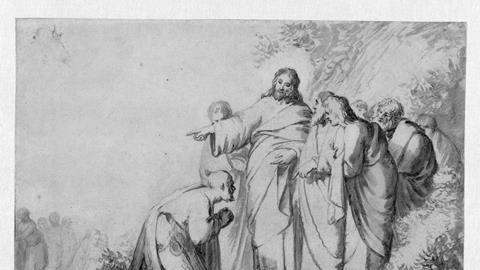Elaine Storkey unpacks scripture to show that God gives each of us the freedom of choice, with an exhortation to stand with those who are persecuted for putting their faith in him.
A young woman asked to speak to me privately at a lecture I gave on gender violence, from my book Scars Across Humanity (SPCK). She wanted me to highlight ‘religious honour killings’. A Christian convert, she had run away from her family six years ago when, at the age of 15, her father told her they were all going back to Pakistan for a family wedding. She discovered, with shock, that it was her own wedding – her family was planning to force her to marry a man from their religion whom she’d never met. Hiding her panic, she went with a pretext about ‘homework’ to her Christian schoolfriend, whose mother immediately packed bags and drove her to safe accommodation in another town. She took a new identity and in the intervening years has lived in peace, trained as a pharmacist and been enveloped by Christian love and care. But she believes that if her family ever found her, they would kill her.
This young woman lives in a country that fosters religious freedom. Many more Christians live in societies that don’t, where the entire legal system is based on the laws of another religion. In Iran, for example, the government is an ‘Islamic theocracy’ where the supreme leader, Ayatollah Ali Khamenei, is regarded as the voice of Allah on earth. Conversion to Christianity is illegal. In Afghanistan a harsh interpretation of Sharia law is imposed and, since the Taliban took over in 2021, most Christians have fled the country. Those who remain can be detained, tortured and even killed. The only way to survive is to keep their faith secret.
God does not compel us to worship him, but gives us the responsibility to choose
In many neighbouring central Asian countries – Kazakhstan, Kyrgyzstan, Tajikistan, Turkmenistan, Uzbekistan, Pakistan – conversion to Christianity is dangerous; those who evangelise are often arrested or imprisoned. Churches are raided, people put under surveillance and Christian families can find it hard to get jobs or education for their children. We know about religious persecution, more than we used to, because of the annual World Watch List put out by the organisation Open Doors. In 2024 they stated that more than 365 million Christians worldwide suffer some form of persecution for their faith, with women suffering double forms of discrimination – both as Christians, and as women.
The Bible supports freedom of choice
The young woman I met has been able to enjoy religious freedom in the UK because it’s protected by law. It’s part of the Christian heritage in the western World. The Bible endorses the belief that God gives freedom of choice to us as human beings, and that includes the freedom to choose whom and how to worship. It’s our own responsibility to make decisions about belief and the way we live, and no one has the right to take that from us. If people make choices that are wilfully wrong, God holds them accountable, but they still have the right to choose.
So many biblical passages support this, in both the Old and New Testament. In a powerful passage in Joshua 24, the leader of the Israelites urged the people to resist idolatry and worship the true God. Yet he left them to choose: “But if serving the Lord seems undesirable to you, then choose for yourselves this day whom you will serve, whether the gods your ancestors served beyond the Euphrates, or the gods of the Amorites, in whose land you are living. But as for me and my household, we will serve the Lord” (v15). This statement is momentous. It points out so clearly that even though God alone is worthy of our worship, he does not compel us to worship him, but gives us the responsibility to choose. Joshua made his choice to serve God and offered the same choice to all.
Religious freedom opens up greater generosity and kindness when it’s fully observed. This principle was communicated to the Israelites in the instructions they received on how to relate to foreigners living among them. Immigrants and aliens were not to be mistreated or subject to discrimination; they were to be “treated as your native-born”. The Israelites had to “love them as yourself” (Leviticus 19:33-34). Even if they worshipped other gods, all people had to be accorded respect, and encouraged into true faith.
In the New Testament Jesus put religious freedom into practice. In Matthew 19:16-23, the rich young ruler asked what he needed to do to gain eternal life. Jesus invited him to give away his wealth to bless the poor and then follow him. The man felt it was too much to ask and “went away sad” (v22), choosing not to follow Christ. The salient point here is that Jesus let him go. Faith is commanded but never coerced. We see this again in Matthew 23:37 where Jesus expressed how much he wanted to gather the people of Jerusalem to himself, but they “were not willing”. The choice was theirs. God does not force belief; Jesus knew this, and prayed for those who did reject God, even when he was dying on the cross: “Father, forgive them for they do not know what they are doing” (Luke 23:34). His prayer is spine-tingling, for Jesus did know the consequences of the choices his persecutors were making.
The issue of religious freedom has faced Christians since the days of the early Church. In Acts 4, Peter and John were preaching in the synagogues and elsewhere and miracles were happening. The Jewish leaders were worried. “Everyone living in Jerusalem knows they have performed a notable sign, and we cannot deny it” (v16). So, the apostles were brought before the Sanhedrin and commanded “not to speak or teach at all in the name of Jesus” (v18). Their clear answer has echoed in Christian lives through the centuries: “Which is right in God’s eyes: to listen to you, or to him? You be the judges. As for us, we cannot help speaking about what we have seen and heard” (vv19-20). Peter and John gave to their prosecutors the right to judge them under law, but they claimed for themselves the freedom to preach and abide by their conscience and convictions. This is the stand of principled, political disobedience, of ‘conscientious objection’. And because of their boldness and courage the message of salvation has travelled from the apostolic community to the ends of the earth.
Freedom of religion in the New Testament acknowledges that it is the Holy Spirit who changes hearts. Governments don’t have that power; no one becomes a true believer in any faith through the instructions of human rulers. The Christian gospel reminds us that we become Christians by the grace of God through faith in Jesus Christ (Ephesians 2:8-9). That’s way beyond the remit of governments! Those who take away religious freedom are endorsing the myth that fallible human leaders can determine the eternal destiny of their citizens. But, when God gives us the freedom to choose, no political or religious regime is entitled to take that away.
How do we uphold religious freedom today?
The biblical upholding of religious freedom has many implications for us as Christians. The first is obvious – we must safeguard it in our own culture. In a country where it’s been taken for granted for so many years, we cannot allow it to be eroded or hijacked by either secularists or religious tyrannies. We need always to be aware of practices or forms of coercion that put our freedom in peril. We need also to be wary of cults, and the influence of cult leaders who manipulate and control people’s minds and decision-making. To uphold the principle of religious freedom as a key part of our legal system is to safeguard the right to pray, to preach, to evangelise and to convert.
We also have a great responsibility to support those Christians who are living under regimes where their freedom to worship and evangelise is denied. We can offer our backing to organisations, such as Open Doors, that work with people in dangerous situations, and tirelessly collect the data that uncovers the truth. We can use their publications to expose the violation of human rights in authoritarian regimes and be part of their advocacy for Christians treated unjustly for their faith. Our prayers, our voices and our contributions will make their work more effective, widening its outreach and empowering those who suffer.
Even social media gives us opportunities to highlight injustices. We can help keep the importance of religious freedom on the public agenda. We can press for it to be on the curriculum of our schools, and part of the concerns of our churches. We can also allow ourselves to be challenged by those Christians ready to face hardship and persecution rather than deny their faith. Let their example encourage us to use our own religious freedom and stand by our sisters and brothers who have none.


































No comments yet